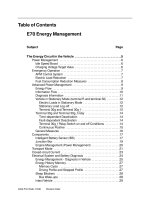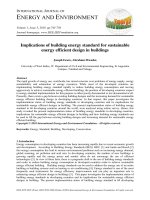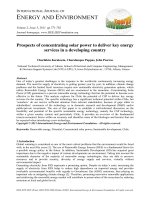Energy transition roadmap presentation
Bạn đang xem bản rút gọn của tài liệu. Xem và tải ngay bản đầy đủ của tài liệu tại đây (4.37 MB, 33 trang )
Nhien Ngo
Hanoi, 20 July 2023
1
• Overview Vietnam’s Clean Energy Transition
• Global and National Commitments
• Different targets: NDC – PDP8 – JETP
• Clean Energy Transition Roadmap
•
•
•
•
•
•
•
Technological Feasibility
Cost and Affordability
Energy Security
Grid Integration and Stability
Environmental Impact
Policy and Regulatory Framework
Stakeholder Engagement
2
Hanoi, 20 July 2023
3
Installed capacity 2011 – 2022
Installed capacity 2022
(Total: 78,8 MW)
GW
77
80
69
70
17
60
55
50
39
40
34
30
23
20
43
10
25
18
28
45
49
17
4
19
Biomass
356
1%
17
Solar
16567
21%
5
Import
619
1%
Coal
25302
32%
5
22
20
78.8 GW
21
22
21
Wind
4667
6%
17
16
13
12
Oil
1579
2%
55%
10
0
2011
2012
2013
Coal
2014
Oil
2015
Gas
2016
Hydro
2017
Wind
2018
Solar
2019
Biomass
2020
Import
2021
2022
includes
hydro, wind
& solar
Hydro
22345
28%
Gas
7398
9%
Source: VIET’s analyze based on the data published by EVN Jan 2023
4
TWh
Power generation by sources 2011 - 2022
Power generation by sources 2022
(Total 268 TWh)
300
Average annual growth 4%/year
Average annual growth 11%/year
250
237
6
243
11
255
30
Other
4.1
2%
RE
34.8
13%
268
35
includes
hydro, wind
& solar
217
200
195
Gas
29.5
11%
180
161
150
100
48%
142
104
117
126
Hydro
95.0
35%
50
0
2011
2012
2013
2014
2015
Other
2016
RE
2017
Hydro
2018
Gas
2019
Coal
2020
2021
2022
Coal
105.0
39%
Source: VIET’s analysis based on the data published by EVN Jan 2023
5
Installed capacity (GW) and share (%) by
market participation
Share of power capacity based on
ownership in 2022
Import
0.6
1%
Imported power
plants, 0.8, 1%
Strategic
hydro power
plants, 8.9, 11%
EVN
8.9
11%
EVNGENCO 2
4.6
6%
Private
33.1
42%
EVNGENCO 3
8.4
11%
Direct trading
power plants,
30.9, 38%
Indirect
trading power
plants, 40.4,
50%
EVNGENCO 1
7.6
9%
BOT
7.7
10%
TKV
1.8
2%
PVN
6.1
8%
Source: VIET’s analyze based on the data published by EVN Jan 2023
6
POWER PRODUCTION AND DEMAND BY AREA
(BILLION KWH)
Demand
800
600
95.89
121.86
123.19
121.39
Production
North - Central transmission volume (GWh)
400
200
0
1
2
3
4
5
6
North to Centre
7
8
9
10
11
10
11
Centre to North
53.78
Centre – South transmission volume (GWh)
4000
24.48
3000
2000
1000
0
1
NORTH
CENTRE
SOUTH
Source: VIET’s analyze based on the data published by EVN NLDC Jan 2023
2
3
4
5
Centre to South
6
7
8
9
Southe to Centre
7
2022 Transitioning project (VND/kWh)
Solar farm: 1.184,9
Floating solar: 1.508,27
Onshore wind: 1.587,12
Offshore wind: 1.815,95
9.21 GW solar (150 plants)
7.66 GW RTS (104k systems)
5.46 GW wind (105 plants)
8
Technology
Ceiling price
(VND/kWh)
Solar farm
1.184,9
Floating solar
1.508,27
Onshore wind
1.587,12
Offshore wind
1.815,95
Source: MOIT, Decision 21/QD-BCT dated 7 Jan 2023
Source: EVN, updated to 14 Jul 2023
/>
9
Capacity of plants participate in power market by 2022
• By end of 2021, 47.3
GW (61% total system
capacity) participated
in power market
• 2.9 GW expected to
join directly in 2022
• Plants <30W and RE is
not obligated to
participate
16.0
14.00
12.00
Capacity (GW)
• 29.3 GW directly
participated
• 18 GW indirectly
participated
16.00
10.00
8.7
7.6
8.00
6.00
5.4
5.2
4.00
1.9
2.00
1.2
0.8
0.6
0.00
Coal power
Gas turbin
Hydro
Hydro
Hydro
Strategic Multi(reservoir
(reservoir
(reservoir purpose hydros
regulated >1 regulated > 2 regulated <2
(SMHP) &
week)
days to 1 week)
days)
hydros
operated with
SMHP
Direct participation
Source: VIET’s analyze based on the Decision 97/QD-DTDL dated 31/12/2021 of ERAV
BOT
In industrial
park and sell
surplus power
Imported
Indirect participation
10
Hanoi, 20 July 2023
11
Prime Minister announced that Vietnam will develop and
implement strong mitigation measures with its resources,
together with international collaboration and support to
reach Net zero emissions in 2050.
122 countries committed to reducing methane emissions
from human activity in all sectors by -30% by 2030 compared
to 2020.
46 countries signed a declaration to promote electricity
generation from clean energy sources and transition of
unabated coal power by the 2030s and 2040s
145 countries signed a commitment to stop and reverse
deforestation by 2030 while ensuring sustainable
development and promoting displacement to include rural
areas .
12
NDC’s BAU for 2030 was calculated based on electricity demand and power sources in PDP VII revised (same as BAU in NDC 2020)
•
73% GHG emissions~ 678.4 MtCO2eq from energy
•
49% GHG emissions ~ 452.3 MtCO2eq from “Energy industry” ~ “power sector”
•
Total installed capacity~ 129.5 GW (of which: 55.3 GW coal power; 19 GW gas; 12 GW solar, and 6 GW wind).
Comparison of total emissions in 2030 under BAU scenario, Commitment to reduce with domestic resources
and Commitment to reduce with international support
1200
Total emissions (MtCO2eq)
1000
800
140.3
46.3
112.1
928 MtCO2
928 MtCO2
600
400
452.3
200
26.4
88.1
0
-200
49%
49%
Reduction
146.3
112.4
37.6
99.7
782 MtCO2
782 MtCO2
Total emissions after reduction
403.7
Industrial Process
Waste
90.5
16.9
61.2
524 MtCO2 LULUCF
524 MtCO2
420.6
287.3
111.6
-49.2
14.7
77.5
100.8
(81.7)
11.3
68.8
84.1
(95.8)
BAU
Unconditional (-15.8%)
Conditional (-43.5%)
Nguồn: NDC cập nhật tháng 11/2022
Agriculture
Energy industry
Household, agriculture and services (energy)
Transportaion
Manufacturing & construction
13
• G7 + DM + NO to mobilize $7.75
billion in public sector financing at more
attractive terms than private capital markets.
• A consortium of private financial institutions,
the Glasgow Financial Alliance for Net Zero
(GFANZ) to raise at least $7.75
in private financing.
billion
• VN Power
sector CO2 emissions to
peak at 170 Mt in 2030 instead of 240 Mt
in 2035.
• VN to limit coal power capacity to 30.2 GW
by 2030 from a projected 37 GW.
• Renewable sources including hydroelectricity
will account for at least 47% of electricity
production in 2030.
14
TWh
JETP’s emission reduction goal in power sector
JETP target on share of RE
600
300
567
240 Mt
250
RE (incl. hydro)
account for at least
47% power generation
200
CO2 emission (Mt)
500
400
300
268
200
266.5
170 Mt
150
Shift of
peak emissions
100
50
37
GW
30,2
GW
100
0
129.8
0
JETP
2022
RE (inl. hydro)
2030
Other sources
Before JETP
Coal
Gas
LNG *
* Emissions estimated by VIETSE
Source: VIETSE plotted based on JETP Declaration
15
PDP8 - Power sector's emission after 2030
Compatible with NZE 2050
Power sector's emissions in 2030
NDC - 15.8%
450
PDP8
JETP
450
420.6
400
400
350
350
287.3
MtCO2
300
MtCO2
NDC - 43.5%
254 (max)
250
200
204
170
(min)
150
100
Conditional
300
250
200
Max emissions
254
204
150
100
50
50
0
0
2030
Min emissions
31
27
2030
2050
Conditions to 170 Mt peak emissions
Receiving strong supports (financial, technologies and governance) of IPG of JETP
Source: NDC updated 11/2022
JETP Vietnam Declaration />Decision No. 500/QD-TTg dated 15/05/2023 of the Prime Minister
16
PDP8
KB_JETP
KB_NZE
KB_NDC
296
198
173
158
198
170
252
189
144
JETP
MtCO2
259
154
131
90
77
43
2025
170
254
2030
2035
2040
30
115
30
2045
2050
30
30
17
2022 good hydro + new renewables =
48% carbon free electricity
RE
34.8
13%
Other
4.1
2%
Gas
29.5
11%
Hydro
95.0
35%
PDP8
May 2023
Coal
105.0
39%
Source: VIETSE data presented using JETP Declaration, EVN data as reference
18
Source: VIETSE data presented using JETP Declaration and energy finance data as reference
19
Source: VIETSE data presented using JETP Declaration and energy finance data as reference
20









